Paul Alkazraji's Blog - Posts Tagged "istanbul"
Thriller is set against background of Turkey’s inner conflicts
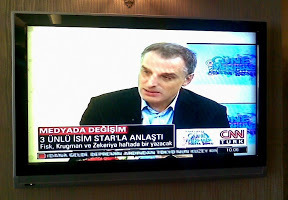
A British writer has had a thriller published that draws on Turkey’s recent inner conflicts and his experiences of the Balkans since he left the UK to live and work in Albania in 2003.
Set in Turkey, Greece and Albania, the story is about a man’s attempt to publish a book, and whether he will make it against setbacks and a danger that is approaching him with deadly intentions. “It is set against a background of church persecution in Turkey, murders and other true events there, including news revelations about the ‘Ergenekon’: a secret cabal plotting to destabilise the country for their own political objectives,” he says.
Entitled ‘The Silencer’, it has scenes in Istanbul and also tells the story of how one young man sets out on a mission of vengeance, caught up in the conflicts between Turkey’s secularists, Islamists and ruling conservative government.
“I hope I’ve been able to evoke some of the atmospheres of each of the Balkan countries, and tell a knife-edge story that grips to the final pages,” he says.
The author, Paul Alkazraji, worked as a freelance journalist in the Nineties and wrote the biographies of Bristol Rovers ex-football hooligan, Dave Jeal, and of Bristol missionary Ian Loring ‘Christ and the Kalashnikov’, as well as travel articles for London’s ‘The Independent’. Since 2004, he has run a magazine for churches in Albania.
“Initially, I went to Albania as a reporter just before the Kosovo crisis,” he says. “I went back again to write an earlier book and met my future wife there. We returned together to live in Albania in 2003, and we both still serve there with the local church. You never can tell how a single trip can change the course of your life!”
The Silencer
Published on June 03, 2013 09:04
•
Tags:
albania, ergenekon, greece, istanbul, justice-and-development-party, malatya, persecution, secularists, the-church, turkey
Behind the scenes... and personal
'The Silencer’ 2nd Anniversary of publication.
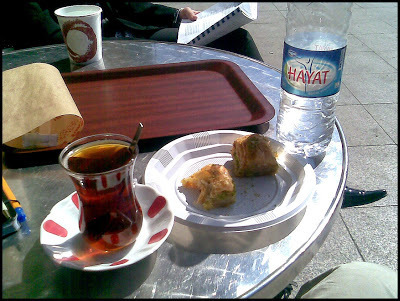
Doing table top research on the Ataturk Boulevard, Istanbul,
just watching...
(Here Sheref Dushman meets contacts and prepares to depart for Greece from Sirkeci Railway Station.)
During the field research I discovered that the 'Friendship Express' service between Istanbul and Thessaloniki had stopped altogether just a month before I wanted to take it. So I had to work out an alternative way of experiencing the journey Sheref makes. My wife and I found a coach trip for Istanbul from Albania on Women's Day 2011, and travelled roughly along the same route through the night, at times parallel to the railway lines. The excursion degenerated into chaos in Istanbul, though, as the passengers complained and demanded their own personal itineraries be met, and the organisers, who had had enough of them, dumped them all in vexation! Caught in the middle of it, we ended up locked inside the coach for over two hours. But that said, I was still able to do what I had set out to. I would have loved to have taken the train. As an aside, it is the first section of the route Bond travels with Tatiana Romanova and the 'SPEKTOR' machine in Fleming's 'From Russia With Love'.
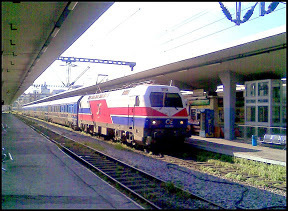
Thessaloniki Railway Station where I just missed catching ‘The Friendship Express’
(by about a month).

With my wife, Albana, and son Hanniel, 6, in Galicitsa Park, F.Y.R.O.M.
September, 2014.
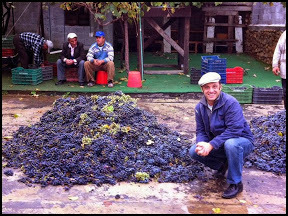
Gathering the grapes in a church yard, Albania.
Me, September, 2014.
By this author: The Silencer

Doing table top research on the Ataturk Boulevard, Istanbul,
just watching...
(Here Sheref Dushman meets contacts and prepares to depart for Greece from Sirkeci Railway Station.)
During the field research I discovered that the 'Friendship Express' service between Istanbul and Thessaloniki had stopped altogether just a month before I wanted to take it. So I had to work out an alternative way of experiencing the journey Sheref makes. My wife and I found a coach trip for Istanbul from Albania on Women's Day 2011, and travelled roughly along the same route through the night, at times parallel to the railway lines. The excursion degenerated into chaos in Istanbul, though, as the passengers complained and demanded their own personal itineraries be met, and the organisers, who had had enough of them, dumped them all in vexation! Caught in the middle of it, we ended up locked inside the coach for over two hours. But that said, I was still able to do what I had set out to. I would have loved to have taken the train. As an aside, it is the first section of the route Bond travels with Tatiana Romanova and the 'SPEKTOR' machine in Fleming's 'From Russia With Love'.

Thessaloniki Railway Station where I just missed catching ‘The Friendship Express’
(by about a month).

With my wife, Albana, and son Hanniel, 6, in Galicitsa Park, F.Y.R.O.M.
September, 2014.

Gathering the grapes in a church yard, Albania.
Me, September, 2014.
By this author: The Silencer
Published on December 04, 2014 02:40
•
Tags:
albania, from-russia-with-love, greece, ian-fleming, istanbul, ohrid, orient-express, sirkeci, the-friendship-express, thessaloniki, turkey
Q and A with author Paul Alkazraji
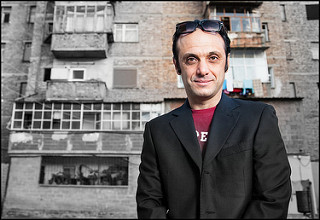
‘The Silencer’ – Turmoil in Turkey and a ‘lone wolf’ who sets out across the Balkans for a strike on a foreign target…
What inspired you to write this story?
I’d had the idea of writing a thriller with a ‘slowly approaching danger’ for some years, but when I read into recent incidents of the persecution of the church in the nearby country of Turkey, it anchored the story in that context more. I began to feel in a new way that there were people not dissimilar to myself close by facing grave dangers. The book gives some account of events there, but I think it is a story that could have come similarly from numerous other countries too. Then I set about looking at how the main character and others around him might deal with facing such frightening realities emotionally and spiritually.
Where does the story begin?
The opening scene on a taxi van (a ‘furgon’) coming over the spectacular Qafë Krrabë road, which climbs into the mountains south of Tirana, Albania, was the first piece of the story I had in place in my head. It is a thrilling route to travel, but preferably in safe driving hands. The manner of driving in the scene is not exaggerated for effect and I’m not alone in having been through some of those white-knuckle experiences written for the protagonist Jude. Though, to be fair I think the general physical condition of many ‘furgons’ has improved in recent years... if not the driving.
What are its themes?
Justice is a main theme of the story, and how when people prosecute their own notions of it, how wide of the mark that frequently falls. In one scene before Jude leads a discussion in class about justice in the French Revolution, two neighbours argue in a nearby apartment block, and one throws dirty water down, but it falls on passers-by, and this is how it is. In the story the Leeds United FC fans’ vengeance catches Sheref, who is not even Galatasaray, he’s Fenerbace... and Sheref’s vengeance falls... well, you’ll need to read it to find out.
Did you make the antagonist’s journey?
Yes, but during the field research I discovered that the ‘Friendship Express’ service between Istanbul and Thessaloniki had stopped altogether just a month before I wanted to get on it. So I had to work out an alternative way of experiencing the journey Sheref makes. My wife and I found a coach trip for Istanbul from Albania on Women’s Day 2011, and travelled roughly along the same route through the night, at times parallel to the railway lines. The excursion degenerated into chaos in Istanbul as the passengers complained and demanded their own personal itineraries be met, and the organisers, who had had enough of them, dumped them all in fatigue. Caught in the middle of it, we ended up locked inside the coach for over two hours. But that said, I was still able to do what I had set out to. I would have loved to have taken the train. As an aside, it is the first section of the route James Bond travels with Tatiana Romanova and the ‘Spectre’ machine in Fleming’s ‘From Russia with Love’.
Are some of characters based on real people?
There are shades of people that I have met and known, but no real people wholesale: they are imaginary concoctions. Though, that said, Jack and Flori Moshohori, the Albanian border guard, come close. The back-story of hard-man Mehmed Krasnichi is loosely-based on the life of someone I have met in Albania, though it is not a true telling of it. It has fictional additions and elaborations, a different physical description, and shouldn’t be taken as accurate at all. In common with other writers, many of the characters are given names that fit them. To mention a few, the goatherd boy in Jude’s class, ‘Liridon’ means, ‘longing for freedom’, and the Turks ‘Gazi’ which means ‘wounded veteran’, and centrally, ‘Sheref Dushman’, which means ‘honour/pride’: ‘the enemy’. There was an Albanian tribe by the name of ‘Dushman’ too.
Have you a favourite minor character?
The minor player of Defrim, a driver with an excess of gizmos on his dashboard, typifies those surprising connections you can find with people when you are travelling. In the back of beyond, you chance upon someone with whom you share absurd things in common. In this instance Defrim is an improbable enthusiast for the 80’s synth-pop act ‘The Human League’. He is also someone for whom Providence has a role in a greater story unfolding all around him.
Where did you learn about the pistol in the epilogue?
Among the many tiles that were brainstormed for the book was ‘The Tokarev Falls’, the reason for which I think is apparent in the epilogue. The operation of the Tokarev TT pistol, standard Albanian Police issue, is correctly described there, and was shown to me by a relative who is licensed to hold one. He dismantled his quickly and set the oily pieces out on my desk inviting me to reassemble it, and I stared blankly at it. He then quickly clipped it all back together, waved it under my nose, and offered it to me to handle. He left me three copper-coloured bullets in my pencil holder as souvenirs.
Can we guess the ending?
I hope that as the plot unfolds there is a sense of events not being pre-determined, and of how in the midst them outcomes can turn on prayer.
Video trailer on vimeo: https://vimeo.com/51611355
Amazon UK reviews: http://www.amazon.co.uk/The-Silencer-...

Published on June 10, 2021 09:04
•
Tags:
adventure, albania, christian, england, greece, istanbul, mission, persecution, suspense, the-church, thessaloniki, thriller, tirana, travel, turkey
New excerpts from 'The Silencer'.
Chapter 10

Photos. Peter Wilson.
Outside the Blue Café under the shade of a silver
birch tree Jude sat with Shpetim Gurbardhi watching
the passers by on the high street. A horse cantered
past pulling a cart piled high with rattling plastic
kitchenware, buckets and brushes, and two gypsy
girls sitting with their legs dangling off the back. A
white car with four young men slunk low drove by,
the windows wound down to protect them surely,
he thought, from the Greek bouzouki music they’d
amplified to a glass-shattering level. At a nearby
table was a man with a grey bandit’s moustache and
a dark beret. He looks like he’s walked out of the
pages of history to join his comrades for a coffee,
before hitching on his bullet belt and heading back
to some Partisan mountain base, he thought.
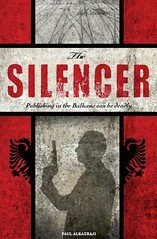
Shpetim balanced his slim, chromed mobile
phone on the marble table and slid his fingers down
the edges before flipping it over. He held it like it was
a thing of wondrous value, which he kept checking
he still actually possessed.
“How much did your sunglasses cost you?” said
Shpetim as they waited for their coffees.
“I don’t remember… maybe £10,” said Jude.
“I can get you a pair the next time I go back to
England.” Shpetim grinned. “Did you try the Earl
Grey tea I gave you?”
“To be truthful, I liked the box,” he said with an
apologetic look. “But the tea tasted of… cologne.”
He reached behind him to his suit jacket hung on the
chair back and took out a sprig of dried, green plants
wrapped in a blue plastic bag. “My mother sent you
this. It’s çaj mali, mountain tea.”
“It looks like something you’ve confiscated,”
said Jude.
“Jude!” he said smiling through a look of reproof.
He then leant closer. “There is a village near here
which produces cannabis… it’s like a plantation.
Most of the residents are involved. So, we had to
put a stop to it. Last year, the police approached it.
The problem was the villagers had posted a sentry…
a ninety-year-old woman with a semi-automatic
weapon. What could we do? Send in the Special
Forces? There would have been an outcry!”
“You should have sent in your grandad, Petrit.
She might have been an old Partisan flame of his.
That would have disarmed her,” said Jude. Shpetim
laughed. His phone rang. It was still set on Lionel
Richie. He stood up and walked a couple of paces
away from the table, then spun around on the ball
of his right foot. Jude watched him as Shpetim fixed
his eyes on a detail of mottling in the table’s white
marble surface. His eyes were clear and set as it
seemed information and calculations sped through
his mind as he listened. He then quietly issued a
series of terse instructions. At one point, when it
appeared he was being countermanded, he drew
his hand towards his chest with fingers and thumb
pinched tightly together, and then splayed them out
in emphasis. He sat down with a dour face.
“Ah, Shqipëria!” he said dropping his head.
“Albania will never become Albania with Albanians
in it!” He glanced at Jude. “Don’t ask.” Fredi the
waiter brought two macchiatos in their blue cups
and set them down on the table.
“Pizza,” Shpetim said to him. Jude nodded
quickly to Fredi so as not to draw him in. “I couldn’t
have borne this work without God Jude… the things
we deal with. I thank Him that people like you came
here.”
“Was it through the children’s group… that you
came in to the church?”
“My parents sent me for the free gifts, what can
I say?” he grinned. “As I stayed, though, the Bible
studies just kind of sank in, until they took root and
meant something.” The lines on his forehead became
less angular. His thick eyebrows straightened. It
seemed to Jude that the light of the world flickered
through his eyes. “And you, was it because of what
happened with your mother?” Jude put a spoon of
sugar in his coffee and stirred.
“Well, things seemed very bleak and broken
after mum died, for sure,” he said. “Then when I got
to university… some of the literature I was reading
didn’t help. I went to the student parties… I liked
them for a while. There was someone special too
that I liked. I thought I could believe in her… but
one night I stumbled upon her at a party with a
university lecturer. There was a whole group of them
sprawled on the floor drunk. It just intensified my
sense of the sham, the corruption of life… in contrast
to the high academic ideals. Do you know what I
mean?”
“Jude. I’m an Albanian and you ask me if I
understand corruption!” said Shpetim with a look
of amusement. Jude smiled.
“I was thinking… What is there to admire or
look up to? What is there that is good or true in this
world? I felt whatever it was they were all suffering
from, I was infected with it too… I was no saint.”
Jude spooned up the remaining sugar grains from
the bottom of his cup and stirred again. “I was
traipsing around the streets of York after a party in the
early hours of the morning one time… and I came to
the Low Ousegate Bridge.”
“The one on the playing card?” said Shpetim.
“Yes… the one we will make the match with,”
said Jude staring into his macchiato. “I looked down
at the River Ouse… black and sweeping under the
bridge. I felt dead inside… so I might as well be
dead in body. Thankfully, I’d read one good book at
that time, A Tale of Two Cities. There’s a character in
there, Sydney Carton, who stands by the River Seine
in Paris at dawn and hears the words of Christ. Well,
I remembered them, and they just seemed to penetrate
me in that moment… ‘He who believes in me, though he
were dead, yet shall he live!’
“So you left the bridge?”
“I walked towards the Minster… it’s a big church
there that dominates the skyline… and waited hours
until it opened. Inside, I got down in the aisle and
prayed. I had a wonderful experience there… a touch
of something that welled up warm and enfolding on
all sides… and through me… like a rain shower. I
lay there until a verger told me to get up because I
was disturbing the tourists.” Shpetim was looking at
him curiously, smiling. “Well, that was the moment
my rudder moved, and I began to inch away from
the busy shipping lane where most of the traffic is.
And here I am… twelve years later, at a café table in
your country.” Fredi arrived and put down Shpetim’s
pizza on the table with cutlery and a ketchup
bottle. Shpetim began to cover it with criss-crossing
lines of the red sauce. He looked up and caught Jude
staring.
“Ç’ ke? What?” said Shpetim. Jude tried to feign
an expression of nonchalance. “It is good you are
here, doing what you are,” he said.
“Not everyone sees it that way,” said Jude.
“So, are you worried about the phone call?” said
Shpetim. “Don’t be. People make a lot of threats
here.”
Chapter 18
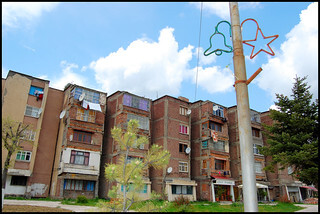
Jude was alone, lying on the living room sofa with
his sandals off, easing his way into a late Sunday
afternoon nap, when a knock came on the apartment
door. It had a character he did not recognise, but not
only for this reason, some sense beyond hearing
caused the hairs on his forearms to ruffle like a wheat
field in a mild breeze. He looked towards the door.
He rose and trod barefoot, through the room into
the entrance hall. He listened. It seemed unnaturally
quiet. He hesitated. Then he turned the latch and
drew in the door. The lights in the stairwell were
off and it took his eyes some seconds to penetrate
the darkness split by the bar of light he’d let out.
He then made out the form of a tall man’s arm and
shoulder standing in close against the wall to the
side. Jude’s senses came alive. Danger was edging
out of the shadow. He knew it. It’s come, he thought
in the splitting of a second.
The man took two quick steps towards him.
Jude stumbled backwards away from his approach
into his entrance hall. The man strode in after him.
Jude backed into the living room stubbing his bare
heel on a raised edge of floor mat. He thought to
turn and run, but he was trapped. He felt his pocket
for his mobile phone. He’d left it on the coffee table.
The man swiftly closed the door behind him. He
advanced over Jude with his eyes kept closely on
him. They then swept around, to the kitchen, and
through doors left ajar.
“You are alone in the house?” he said tersely,
with, Jude noted instantly, a Kosovar accent.
“My wife will be here any moment… I have
friends who will call me,” said Jude staring back
levelly, but breathing heavily.
“Sit down,” he ordered. Jude complied observing
the man cautiously as he too was being observed.
He had a sallow, clean-shaven face. He was physically
lean and coiled with alertness. He was wearing
a pressed, grey shirt, black trousers and polished,
black slip-on shoes. His eyes were firm, but not
cruel, Jude thought.
“I would like your assistance,” he said briskly.
“There are two ways we can do this. You can give
your co-operation willingly… or there are other
ways.” He placed a hand purposefully by his trouser
waist. Jude could see clearly the L-shaped bulge of
a pistol below the cloth. “I think that we understand
each other.” Jude nodded. The man now stood at
ease like a soldier used to standing to attention.
“The manuscript… I would like to see it,” he said.
“You want… to read it here, or to take a copy?”
“You have a computer, I presume, so open it.”
Jude indicated with his eyes towards the side desk,
stood up slowly, and walked to his laptop. He keyed
in the password, slotted in the USB stick Spiro had
given him after church, and clicked open the file.
“You can relax now,” said the man. “Make some
coffee for yourself if it eases you. If your wife comes,
you will tell her I am a friend of Mehmed’s. Act
wisely now…” He positioned the chair and laptop
so that he could see over the rim of the screen to
observe Jude with ease.
Jude walked cautiously to the kitchen and took
down his Mr Rochester’s Mug from a shelf. He went
through the motions of making a pint of tea to give
himself something to focus on. Where was Alex, he
thought? She’d been out for hours! Maybe it was
better she didn’t return now to disturb this man. He
prayed in the quiet anxiety of his mind that it would
be so, and thought. His heartbeat felt quicker, but
not racing. This man is controlled, not wild, professional,
he reasoned: first the pressure, then the
courtesy. He looked to be scrolling quickly though
the pages, stopping periodically. He seems to know
what he is looking for, thought Jude. If I do as he
says, he will do nothing unreasonable. I’ll be okay
now.
Jude’s mobile phone suddenly made a loud rattle
as it vibrated on the coffee table surface. He looked
at the man. He was watching him. Jude walked over
and glanced at the phone’s screen for the caller’s
ID. It was Spiro. Oh Lord, thought Jude. He lifted it
slowly and pressed the green button to accept.
“Jude. Je mirë? Is everything okay with you?” he
heard Spiro say.
“Yes. Of course it is! I’m relaxing with a cup of
tea, like a true Englishman… Mos ki merak,” he said
trying to add a light-hearted touch.
“Okay then…” said Spiro pausing. “I’ll see you
in the morning then.” Spiro hung up and Jude put
the phone back down on the coffee table.
He now waited silently holding his mug of tea,
though he did not drink any, whilst the man looked
at the computer screen for another thirty minutes.
The man then folded the laptop closed.
“This is the version you propose to publish?” he said.
“Yes. It is finished now.”
“You will take out this name on page 45… and
insert a pseudonym. You will then have no difficulties
with us.” He produced a scrap of paper from his
shirt pocket, wrote down something and placed it on
the desk. He stood up briskly and walked towards
the entrance hall.
“Who are you?” asked Jude gently. The man
sauntered a step, turned and looked at him.
“Tell Mehmed… friends in Prishtina send their
regards.” Jude felt a little emboldened by the man’s
change of body language. He’d got what he’d come for.
“Were you at Edona’s apartment… near the
Bajram Curri Boulevard in Tirana?” He did not say
anything. You were, thought Jude. “Were you…
your people… on the Qafë Krrabë ridge road? Did
you telephone me?”
“I know nothing of these things,” he said. He
then hesitated as if considering something. “The
book… it is… interesting. Others may not take that
view however.”
“What others?” asked Jude. He looked at Jude
with an expression of worldly knowing.
“Mehmed is a man with a long past.”
“He also has a new future,” said Jude.
“In this world?” he said with a cynical glazing
passing over his eyes. “If others permit it…” Jude
then heard men’s voices rising up the stairwell. An
officious knock was hammered on the door.
“Jude? Ke ndonjë hall? Is everything alright?”
shouted Spiro. Jude stared into the entrance hall.
His heart groaned, and his mind flashed through
outcomes of this man’s hand being forced. The man
gave him a look of gunmetal coldness. It said: ‘Don’t
move. Don’t even swallow…’

Paul Alkazraji.
Copyright Paul Alkazraji. Highland Books Ltd. 2012. All Rights Reserved.

Find ‘The Silencer’ on Amazon.
https://www.amazon.co.uk/gp/product/B...
Also by this author.


Photos. Peter Wilson.
Outside the Blue Café under the shade of a silver
birch tree Jude sat with Shpetim Gurbardhi watching
the passers by on the high street. A horse cantered
past pulling a cart piled high with rattling plastic
kitchenware, buckets and brushes, and two gypsy
girls sitting with their legs dangling off the back. A
white car with four young men slunk low drove by,
the windows wound down to protect them surely,
he thought, from the Greek bouzouki music they’d
amplified to a glass-shattering level. At a nearby
table was a man with a grey bandit’s moustache and
a dark beret. He looks like he’s walked out of the
pages of history to join his comrades for a coffee,
before hitching on his bullet belt and heading back
to some Partisan mountain base, he thought.

Shpetim balanced his slim, chromed mobile
phone on the marble table and slid his fingers down
the edges before flipping it over. He held it like it was
a thing of wondrous value, which he kept checking
he still actually possessed.
“How much did your sunglasses cost you?” said
Shpetim as they waited for their coffees.
“I don’t remember… maybe £10,” said Jude.
“I can get you a pair the next time I go back to
England.” Shpetim grinned. “Did you try the Earl
Grey tea I gave you?”
“To be truthful, I liked the box,” he said with an
apologetic look. “But the tea tasted of… cologne.”
He reached behind him to his suit jacket hung on the
chair back and took out a sprig of dried, green plants
wrapped in a blue plastic bag. “My mother sent you
this. It’s çaj mali, mountain tea.”
“It looks like something you’ve confiscated,”
said Jude.
“Jude!” he said smiling through a look of reproof.
He then leant closer. “There is a village near here
which produces cannabis… it’s like a plantation.
Most of the residents are involved. So, we had to
put a stop to it. Last year, the police approached it.
The problem was the villagers had posted a sentry…
a ninety-year-old woman with a semi-automatic
weapon. What could we do? Send in the Special
Forces? There would have been an outcry!”
“You should have sent in your grandad, Petrit.
She might have been an old Partisan flame of his.
That would have disarmed her,” said Jude. Shpetim
laughed. His phone rang. It was still set on Lionel
Richie. He stood up and walked a couple of paces
away from the table, then spun around on the ball
of his right foot. Jude watched him as Shpetim fixed
his eyes on a detail of mottling in the table’s white
marble surface. His eyes were clear and set as it
seemed information and calculations sped through
his mind as he listened. He then quietly issued a
series of terse instructions. At one point, when it
appeared he was being countermanded, he drew
his hand towards his chest with fingers and thumb
pinched tightly together, and then splayed them out
in emphasis. He sat down with a dour face.
“Ah, Shqipëria!” he said dropping his head.
“Albania will never become Albania with Albanians
in it!” He glanced at Jude. “Don’t ask.” Fredi the
waiter brought two macchiatos in their blue cups
and set them down on the table.
“Pizza,” Shpetim said to him. Jude nodded
quickly to Fredi so as not to draw him in. “I couldn’t
have borne this work without God Jude… the things
we deal with. I thank Him that people like you came
here.”
“Was it through the children’s group… that you
came in to the church?”
“My parents sent me for the free gifts, what can
I say?” he grinned. “As I stayed, though, the Bible
studies just kind of sank in, until they took root and
meant something.” The lines on his forehead became
less angular. His thick eyebrows straightened. It
seemed to Jude that the light of the world flickered
through his eyes. “And you, was it because of what
happened with your mother?” Jude put a spoon of
sugar in his coffee and stirred.
“Well, things seemed very bleak and broken
after mum died, for sure,” he said. “Then when I got
to university… some of the literature I was reading
didn’t help. I went to the student parties… I liked
them for a while. There was someone special too
that I liked. I thought I could believe in her… but
one night I stumbled upon her at a party with a
university lecturer. There was a whole group of them
sprawled on the floor drunk. It just intensified my
sense of the sham, the corruption of life… in contrast
to the high academic ideals. Do you know what I
mean?”
“Jude. I’m an Albanian and you ask me if I
understand corruption!” said Shpetim with a look
of amusement. Jude smiled.
“I was thinking… What is there to admire or
look up to? What is there that is good or true in this
world? I felt whatever it was they were all suffering
from, I was infected with it too… I was no saint.”
Jude spooned up the remaining sugar grains from
the bottom of his cup and stirred again. “I was
traipsing around the streets of York after a party in the
early hours of the morning one time… and I came to
the Low Ousegate Bridge.”
“The one on the playing card?” said Shpetim.
“Yes… the one we will make the match with,”
said Jude staring into his macchiato. “I looked down
at the River Ouse… black and sweeping under the
bridge. I felt dead inside… so I might as well be
dead in body. Thankfully, I’d read one good book at
that time, A Tale of Two Cities. There’s a character in
there, Sydney Carton, who stands by the River Seine
in Paris at dawn and hears the words of Christ. Well,
I remembered them, and they just seemed to penetrate
me in that moment… ‘He who believes in me, though he
were dead, yet shall he live!’
“So you left the bridge?”
“I walked towards the Minster… it’s a big church
there that dominates the skyline… and waited hours
until it opened. Inside, I got down in the aisle and
prayed. I had a wonderful experience there… a touch
of something that welled up warm and enfolding on
all sides… and through me… like a rain shower. I
lay there until a verger told me to get up because I
was disturbing the tourists.” Shpetim was looking at
him curiously, smiling. “Well, that was the moment
my rudder moved, and I began to inch away from
the busy shipping lane where most of the traffic is.
And here I am… twelve years later, at a café table in
your country.” Fredi arrived and put down Shpetim’s
pizza on the table with cutlery and a ketchup
bottle. Shpetim began to cover it with criss-crossing
lines of the red sauce. He looked up and caught Jude
staring.
“Ç’ ke? What?” said Shpetim. Jude tried to feign
an expression of nonchalance. “It is good you are
here, doing what you are,” he said.
“Not everyone sees it that way,” said Jude.
“So, are you worried about the phone call?” said
Shpetim. “Don’t be. People make a lot of threats
here.”
Chapter 18

Jude was alone, lying on the living room sofa with
his sandals off, easing his way into a late Sunday
afternoon nap, when a knock came on the apartment
door. It had a character he did not recognise, but not
only for this reason, some sense beyond hearing
caused the hairs on his forearms to ruffle like a wheat
field in a mild breeze. He looked towards the door.
He rose and trod barefoot, through the room into
the entrance hall. He listened. It seemed unnaturally
quiet. He hesitated. Then he turned the latch and
drew in the door. The lights in the stairwell were
off and it took his eyes some seconds to penetrate
the darkness split by the bar of light he’d let out.
He then made out the form of a tall man’s arm and
shoulder standing in close against the wall to the
side. Jude’s senses came alive. Danger was edging
out of the shadow. He knew it. It’s come, he thought
in the splitting of a second.
The man took two quick steps towards him.
Jude stumbled backwards away from his approach
into his entrance hall. The man strode in after him.
Jude backed into the living room stubbing his bare
heel on a raised edge of floor mat. He thought to
turn and run, but he was trapped. He felt his pocket
for his mobile phone. He’d left it on the coffee table.
The man swiftly closed the door behind him. He
advanced over Jude with his eyes kept closely on
him. They then swept around, to the kitchen, and
through doors left ajar.
“You are alone in the house?” he said tersely,
with, Jude noted instantly, a Kosovar accent.
“My wife will be here any moment… I have
friends who will call me,” said Jude staring back
levelly, but breathing heavily.
“Sit down,” he ordered. Jude complied observing
the man cautiously as he too was being observed.
He had a sallow, clean-shaven face. He was physically
lean and coiled with alertness. He was wearing
a pressed, grey shirt, black trousers and polished,
black slip-on shoes. His eyes were firm, but not
cruel, Jude thought.
“I would like your assistance,” he said briskly.
“There are two ways we can do this. You can give
your co-operation willingly… or there are other
ways.” He placed a hand purposefully by his trouser
waist. Jude could see clearly the L-shaped bulge of
a pistol below the cloth. “I think that we understand
each other.” Jude nodded. The man now stood at
ease like a soldier used to standing to attention.
“The manuscript… I would like to see it,” he said.
“You want… to read it here, or to take a copy?”
“You have a computer, I presume, so open it.”
Jude indicated with his eyes towards the side desk,
stood up slowly, and walked to his laptop. He keyed
in the password, slotted in the USB stick Spiro had
given him after church, and clicked open the file.
“You can relax now,” said the man. “Make some
coffee for yourself if it eases you. If your wife comes,
you will tell her I am a friend of Mehmed’s. Act
wisely now…” He positioned the chair and laptop
so that he could see over the rim of the screen to
observe Jude with ease.
Jude walked cautiously to the kitchen and took
down his Mr Rochester’s Mug from a shelf. He went
through the motions of making a pint of tea to give
himself something to focus on. Where was Alex, he
thought? She’d been out for hours! Maybe it was
better she didn’t return now to disturb this man. He
prayed in the quiet anxiety of his mind that it would
be so, and thought. His heartbeat felt quicker, but
not racing. This man is controlled, not wild, professional,
he reasoned: first the pressure, then the
courtesy. He looked to be scrolling quickly though
the pages, stopping periodically. He seems to know
what he is looking for, thought Jude. If I do as he
says, he will do nothing unreasonable. I’ll be okay
now.
Jude’s mobile phone suddenly made a loud rattle
as it vibrated on the coffee table surface. He looked
at the man. He was watching him. Jude walked over
and glanced at the phone’s screen for the caller’s
ID. It was Spiro. Oh Lord, thought Jude. He lifted it
slowly and pressed the green button to accept.
“Jude. Je mirë? Is everything okay with you?” he
heard Spiro say.
“Yes. Of course it is! I’m relaxing with a cup of
tea, like a true Englishman… Mos ki merak,” he said
trying to add a light-hearted touch.
“Okay then…” said Spiro pausing. “I’ll see you
in the morning then.” Spiro hung up and Jude put
the phone back down on the coffee table.
He now waited silently holding his mug of tea,
though he did not drink any, whilst the man looked
at the computer screen for another thirty minutes.
The man then folded the laptop closed.
“This is the version you propose to publish?” he said.
“Yes. It is finished now.”
“You will take out this name on page 45… and
insert a pseudonym. You will then have no difficulties
with us.” He produced a scrap of paper from his
shirt pocket, wrote down something and placed it on
the desk. He stood up briskly and walked towards
the entrance hall.
“Who are you?” asked Jude gently. The man
sauntered a step, turned and looked at him.
“Tell Mehmed… friends in Prishtina send their
regards.” Jude felt a little emboldened by the man’s
change of body language. He’d got what he’d come for.
“Were you at Edona’s apartment… near the
Bajram Curri Boulevard in Tirana?” He did not say
anything. You were, thought Jude. “Were you…
your people… on the Qafë Krrabë ridge road? Did
you telephone me?”
“I know nothing of these things,” he said. He
then hesitated as if considering something. “The
book… it is… interesting. Others may not take that
view however.”
“What others?” asked Jude. He looked at Jude
with an expression of worldly knowing.
“Mehmed is a man with a long past.”
“He also has a new future,” said Jude.
“In this world?” he said with a cynical glazing
passing over his eyes. “If others permit it…” Jude
then heard men’s voices rising up the stairwell. An
officious knock was hammered on the door.
“Jude? Ke ndonjë hall? Is everything alright?”
shouted Spiro. Jude stared into the entrance hall.
His heart groaned, and his mind flashed through
outcomes of this man’s hand being forced. The man
gave him a look of gunmetal coldness. It said: ‘Don’t
move. Don’t even swallow…’

Paul Alkazraji.
Copyright Paul Alkazraji. Highland Books Ltd. 2012. All Rights Reserved.

Find ‘The Silencer’ on Amazon.
https://www.amazon.co.uk/gp/product/B...
Also by this author.

Published on January 27, 2023 02:16
•
Tags:
adventure, albania, christian, england, greece, istanbul, mission, persecution, suspense, the-church, thessaloniki, thriller, tirana, travel, turkey



